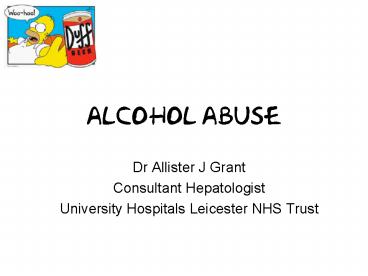Alcohol abuse - PowerPoint PPT Presentation
1 / 25
Title:
Alcohol abuse
Description:
9 million adults in the UK who are drinking over the recommended daily limits ... Drunk and disorderly. Domestic violence. Drinking Cessation. Detoxification ... – PowerPoint PPT presentation
Number of Views:81
Avg rating:3.0/5.0
Title: Alcohol abuse
1
Alcohol abuse
- Dr Allister J Grant
- Consultant Hepatologist
- University Hospitals Leicester NHS Trust
2
Definitions
- Weekly safe limits
- 21 units 14 units
- Harmful Drinking
- 22-50 units 15-35 units
- Hazardous Drinking (very heavy)
- gt50 units gt35 units
- Binge drinker
- gt10 units gt7 units in one session
3
The Burden of Alcohol
- 9 million adults in the UK who are drinking over
the recommended daily limits - people aged 16-24 are the heaviest drinkers
- The Royal Liverpool University Hospital, 12 of
AE attendances were shown to be directly related
to alcohol - In inner city AE departments approximately 75
of patients attending after midnight are drunk - 20 of patients admitted to hospital for
illnesses unrelated to alcohol, are drinking at
hazardous levels
4
- In 2000
- 32 of 16-19 year old women had a hazardous
drinking problem - 61 of 20-24 year old men had a hazardous
drinking problem
5
Taking an Alcohol History
- 1 unit Xg EtOH half pint normal
beer/lager small glass of wine - pub measure of spirits
8
6
Detection of patients with excessive consumption
- Include in general lifestyle review (including
smoking, exercise, diet etc) - Non-judgemental approach
- Quantity / frequency assessment
- Other questionnaires, eg
- CAGE
- AUDIT
- MAST
7
Harmful effects of alcohol
ALCOHOL
8
Neurological Effects of Alcohol
- Acute intoxication
- Blackouts
- Withdrawal- hallucinations, tremor, fits
- Persistent brain damage - WE/ Korsakoffs
Psychosis, Cerebellar degeneration, dementia,
Marchiafava-Bignami Syndrome - Cerebrovascular disease- strokes, SAH
- Head Injury- SDH, EDH
- Nerve and muscle damage- Peripheral Neuropathy,
myopathy, rhabdomyolysis
9
Alcohol Withdrawal
- GABA ,Glutamate ,DA ,Adrenalin
- Occurs in 40- not related to amount
- Hallucinations - 25 of heavy drinkers
- within 24hrs of last drink
- May be leucid unlike the DTs
10
Alcohol Withdrawal
- DTs occur in 5
- 2-5 days post cessation
- Auditory/visual hallucinations
- Reduced consciousness/ confusion
- Delusions
- Tremor
- HRgt100
- Agitation
- Fever
- Autonomic over activity
11
Symptoms of DTs
Autonomic overactivity
NO YES
Chlordiazepoxide 50mg/2h Or Diazepam 10mg iv
every 30-60mins Or Lorazepam 2mg iv followed by
1mg 4-6 hourly With Pabrinex iv 2 amp pairs tds
Withdrawal symptoms
MILD MOD/SEV
Admit and continue treatment
Oral chlordiazepoxide With Pabrinex iv 1 amp
pair/d
YES
Risk factors for progression gt15u/d, Hx of
seizures/DT Malnourishment, high anxiety,?Glc,?K,
No treatment necessary
NO
12
Oral Chlordiazepoxide Regime
Breakthrough doses Appropriate fluid and
electrolyte management, K, Glc, Mg,
PO4 Nursing Care
13
Wernickes Encephalopathy
- 12.5 of alcohol misusers
- Fatal in 17
- Permanent damage in 85 if inappropriately
managed survivors - Acute/ subacute Mental Changes 82
- Ataxia 23
- Eye signs 29
10
14
Mechanism of cell death in WE
15
Management of Wernickes Encephalopathy
Alcohol misuser with one of Acute
confusion Reduced conscious level Memory
disturbance Ataxia/unsteadiness Opthalmoplegia Nys
tagmus Unexplained hypotension/hypothermia
YES
NO
WE
Risk factors Intercurrent illness DTs/seizures W
t loss Malnutrition DV gt20units/d Peripheral
neuropathy
Pabrinex iv 2 ampoule pairs tds For 2-3 days
then 1 ampoule pair daily For 3-5 days
YES
Pabrinex iv 1 ampoule pair daily For 3-5 days
Admit and treat
NO
16
Hepatic Complications of Alcohol
- Fatty Liver
- ASH
- Alcoholic Hepatitis
- Cirrhosis
- HCC
17
Hepatic Pathology
18
GI Complications
- Reflux, vomiting, carcinoma of mouth, oesophagus,
large bowel - Gastritis, impaired ulcer healing
- Small bowel diarrhoea and malabsorption
- Pancreas- Acute and chronic pancreatitis, Ca
- Malnutrition, weight loss
19
Cardio-Respiratory
- Cardiomyopathy
- Arrhythmias
- Hypertension
- Cardiac Beriberi
- Rib
- Pneumonia
20
Metabolic Complications
- Pseudo-Cushings Syndrome
- Hypoglycaemia
- Obesity
- Hypogonadism
- Hyperuricaemia
- Hyperlipidaemia
21
Psycho-Social Forensic Complications
- Impaired work/loss of job
- Accidents
- Marriage breakdown
- Depression
- Drink driving convictions
- Drunk and disorderly
- Domestic violence
22
Drinking Cessation
- Detoxification
- Specialist Alcohol Rehabilitation
- Brief Interventions
- Pharmacotherapy
23
Brief Interventions
- Aimed at hazardous drinkers
- Short duration and user friendly
- Generalist workers in non-specialised settings
- Consists 1) assessment of intake
- 2) info on harmful/hazardous drinking
- 3) advice, booklets and local services
24
Effectiveness of brief intervention systematic
review 7 trials
- Some 20 - 30 of excessive drinkers will revert
to sensible level of drinking for at least 1
year. - In general practice, 5 - 10 minutes intervention
with follow-up leads to around 25 - 35
reduction in alcohol consumption.
Freemantle N, Gill P, Godfrey C. Effective Health
1993
25
(No Transcript)































